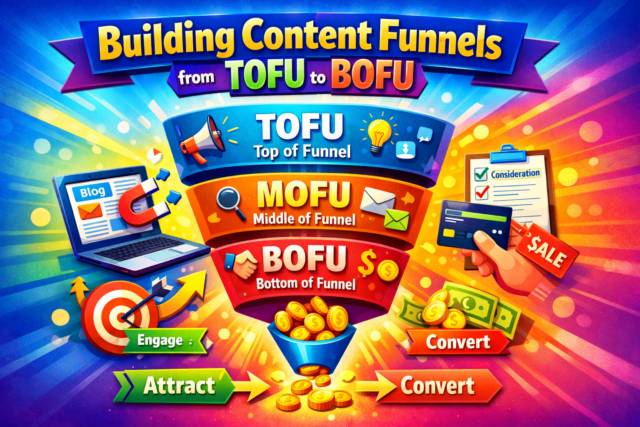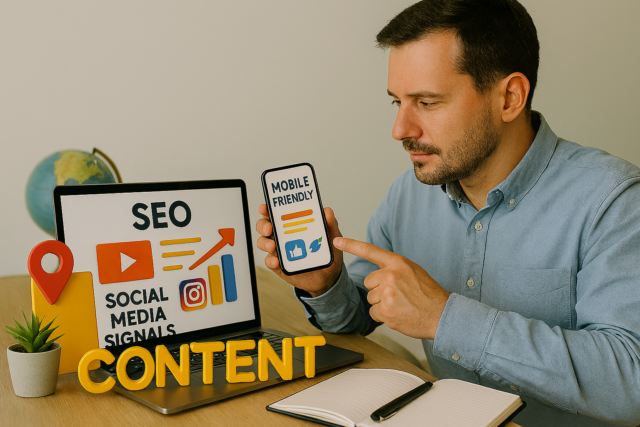Artificial Intelligence (AI) is no longer just about futuristic robots or science fiction. It has permeated various industries, including marketing. For marketers, AI offers tools to automate repetitive tasks, personalize content, manage leads, and analyze customer behavior. The rapid development of AI in digital marketing is reshaping digital marketing, providing innovative ways for brands to engage with their audience and optimize their strategies.
The Pros and Cons of AI in Digital Marketing
Artificial Intelligence (AI) has become an integral part of digital marketing, providing various tools and techniques that help brands enhance their marketing efforts. While AI offers numerous benefits, it also comes with challenges. Understanding AI’s pros and cons in digital marketing is crucial for marketers to make informed decisions about integrating AI into their strategies.
The Pros of AI in Digital Marketing
Boosts Productivity
AI significantly enhances productivity by automating repetitive tasks. This allows marketers to focus more on their campaigns’ creative and strategic aspects. For instance, AI-powered social media schedulers can post content at optimal times, maximizing engagement without requiring manual intervention. This automation extends to tasks such as data entry, customer query responses, and campaign monitoring, freeing up valuable time for marketers to innovate and plan.
Drives Efficiency
AI greatly improves efficiency in marketing operations. Tasks such as sorting leads, responding to customer inquiries, and managing data are streamlined through AI systems. These systems can handle large volumes of data quickly and accurately, reducing the manual effort involved and minimizing the risk of errors. For example, chatbots can handle many customer service queries, providing instant responses and improving customer satisfaction.
Offers Insights
AI excels in data analysis, providing deep insights into customer behavior and campaign performance. By analyzing large datasets, AI can identify patterns and trends that might not be immediately obvious to human analysts. These insights enable marketers to make data-driven decisions, optimizing their strategies for better results. AI tools can track various metrics, such as engagement rates, conversion rates, and customer journey paths, providing a comprehensive understanding of campaign effectiveness.
Personalization at Scale
One of the standout benefits of AI in marketing is its ability to deliver personalized experiences at scale. AI can analyze customer data to create tailored content and recommendations, enhancing the customer experience. This is particularly valuable in email marketing, where AI can segment audiences based on their behavior, preferences, and demographics, delivering personalized messages that resonate with each segment. This level of personalization can lead to higher engagement and conversion rates.
Content Generation and Optimization
AI tools can generate and optimize content across various digital channels, ensuring it aligns with SEO best practices and appeals to the target audience. For instance, AI can help create blog posts, social media updates, and ad copy optimized for relevant keywords and user intent. Additionally, AI can analyze existing content to identify opportunities for improvement, such as optimizing headlines, meta descriptions, and content structure for better search engine rankings.
Boosts ROI
By leveraging AI insights, marketers can predict buying behavior and deliver relevant content at each marketing funnel stage. This targeted approach improves the user experience and increases the likelihood of conversions, ultimately boosting return on investment (ROI). AI-driven marketing strategies can identify high-value leads, optimize ad spend, and allocate resources more effectively, maximizing the impact of marketing efforts.
Predictive Analysis
AI’s predictive analysis capabilities allow marketers to anticipate market trends and customer behavior based on historical data. This foresight enables more accurate and effective planning, helping brands stay ahead of the competition. Predictive models can forecast demand, identify emerging trends, and suggest optimal marketing strategies, ensuring that marketing efforts are timely and relevant.
The Cons of AI in Digital Marketing
Lack of Accuracy
While AI systems are powerful, they are not infallible. Errors in the data used by AI can lead to inaccuracies in analysis and decision-making. For instance, if an AI system is fed incorrect or biased data, the insights and predictions it generates may be flawed, leading to costly business decisions. Ensuring the quality and accuracy of data is critical for reliable AI performance.
Requires Skills
Despite becoming more user-friendly, AI tools still require a certain level of knowledge and skills to use effectively. Marketers must understand how to set up and interpret AI tools, which may involve learning new software or programming skills. This need for upskilling can be a barrier for some marketers, necessitating training and hands-on experience to leverage AI capabilities fully.
Bias
AI is only as effective as the data it uses, and if that data contains biases, the AI system will perpetuate those biases. This can result in skewed insights and unfair outcomes. For example, suppose the data used to train an AI system predominantly represents a particular demographic. In that case, the system may favor that demographic in its predictions and recommendations, leading to biased marketing strategies. Marketers must be vigilant about the quality and diversity of their data.
Data Sensitivity and Security
AI systems handle extensive datasets, including sensitive customer details and purchasing history. Ensuring the security and privacy of this data is paramount to prevent breaches and maintain customer trust. Marketers must implement robust data security measures and comply with regulations such as GDPR to protect sensitive information.
Ethics
Ethical concerns arise with using AI in marketing, particularly regarding user consent, data manipulation, and hyper-targeted ads. The intrusive nature of highly personalized ads can make customers feel uncomfortable or manipulated. Additionally, there are concerns about the ethical use of AI in monitoring and analyzing user behavior without explicit consent. Marketers must navigate these ethical challenges carefully to maintain trust and transparency with their audience.
Transparency
As AI-generated content becomes more common, plagiarism, authorship, and intellectual property rights issues become more relevant. Questions about who owns the rights to AI-generated content and how to attribute authorship must be addressed. Furthermore, transparency in how AI systems make decisions and generate content is crucial to avoid misleading customers and maintain ethical standards.
Different Types of AI in Digital Marketing
AI encompasses a variety of tools, techniques, and methods that enable machines to perform tasks that traditionally require human intelligence. Here are some commonly used AI technologies in marketing:
Machine Learning
Machine learning (ML) enables machines to learn from data and make predictions or decisions without being explicitly programmed. This technology is widely used in ad targeting, lead generation, and search engine optimization. Social media platforms like Facebook, X (formerly Twitter), and Instagram utilize ML algorithms to enhance user experiences and improve usability.
For instance, ML can analyze large sets of customer data to identify patterns and categorize customers based on behavior, preferences, demographics, location, and purchasing history. This helps marketers create tailored content across emails, landing pages, and social media posts for customer segments.
AI Assistants & Chatbots
Chatbots, powered by ML and Natural Language Processing (NLP), interact with customers, answer queries, and fulfill orders. They are now commonplace on websites, providing instant assistance to visitors. Platforms like Drift and Intercom help businesses offer automated response systems and gather visitor information.
For example, Lyro, a conversational AI used by brands like Glossier, Uber, and Netflix, manages customer queries effectively. Walmart has also implemented ‘My Assistant,’ a generative AI tool that assists its 1.6 million employees with various tasks, including answering HR-related questions and summarizing meeting notes.
Voice Search
AI-driven voice search is gaining popularity. According to NPR and Edison Research, 62% of Americans use voice assistants, and 36% own smart speakers like Alexa or Siri. Google integrates AI into its voice recognition technology across products like Google Search, Google Assistant, and Google Home devices.
Voice search impacts SEO as users increasingly seek information through spoken queries. Marketers must optimize their content to ensure it is easily discoverable through voice search.
Marketing Automation & Personalization
AI-driven marketing automation uses machine learning algorithms to automate and optimize marketing activities. This technology enhances personalization, making marketing messages more relevant to individual customers. It is also cost-effective, freeing up resources for more strategic tasks.
AI helps marketers identify growth opportunities, optimize ad spending, and improve customer engagement. For example, tails.com used Google’s AI-powered tools to triple conversions and achieve a record high in trial sign-ups.
Will AI Replace Digital Marketers?
There is an ongoing debate about AI replacing jobs. However, in marketing, AI should be viewed as a tool to enhance and optimize activities rather than replace human creativity and strategy. AI performs many tasks well but requires human oversight to review, tweak, and optimize its outputs.
Marketers should embrace AI tools and gain hands-on experience to leverage them effectively. Whether generating content, optimizing paid ads, or creating email workflows, AI can significantly enhance marketing efforts.
As an AI educator and copywriter, Kerry Harrison emphasizes, “Nurture your human creativity, apply it wherever you can, and enjoy the creative process. AI is great, but it’s not a patch on that.”
The Future of AI in Digital Marketing
AI is already transforming marketing by helping companies better understand their customers and engage with them through optimized content and channels. Major companies like HubSpot, Zapier, and Salesforce are incorporating AI solutions to assist marketers in their tasks.
Kaltura’s ‘Riding the Wave’ report states, “69% of marketing departments have invested in paid subscriptions for AI tools, with another 29% planning to subscribe.” This trend indicates that AI will continue to play a crucial role in marketing strategies.
AI will enhance marketing through hyper-personalization, improving customer experiences, and streamlining campaign processes. It will optimize activities across digital channels, including social media, email, and influencer marketing.
AI will play a significant role in search marketing. With competition for consumer attention intensifying, marketers must create human and AI-friendly content to achieve visibility in search results. As Luke O’Leary, VP at NP Digital, notes, “The rise of AI through SGE and other companies like ChatGPT means we’re getting answer engines that are great ways to get information.” AI also influences how people use social media platforms like TikTok, which are becoming search engines in their own right.
Conclusion
AI in digital marketing transforms how brands engage with their audience, optimize their strategies, and achieve their goals. While AI offers numerous benefits, it also challenges marketers to navigate. By understanding the pros and cons of AI, leveraging different AI technologies, and integrating AI into their workflows, marketers can harness its power to drive productivity, efficiency, and personalization. The future of AI in digital marketing is bright, and those who embrace it will be well-positioned to succeed in an increasingly competitive landscape.
Read More:





